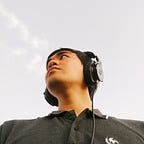Adam Silvera’s More Happy than Not is a testimony of rediscovering identity
Adam Silvera’s 2015 young adult debut novel, More Happy than Not, is many things in one. We meet the seventeen-year-old Aaron Sato who lives with his mother and brother in a dingy apartment in the Bronx. In this community, he maintains an almost steady relationship with his girlfriend, Genvieve, and catches up with his friends for recreation and sports. But when he meets the new guy Thomas, he rediscovers what he has been avoiding in his traumatic past.
Aaron has his reasons for being himself the same way that angsty Holden Caulfield in J.D. Salinger’s The Catcher in the Rye hates the world, or the optimistic Augustus “Gus” Waters in John Green’s The Fault in Our Stars fears oblivion. For one, Aaron has experienced troubles both by circumstance caused by the people who wished for him to change and one of his own doing. He loves reading comics, praising his girlfriend’s paintings, and even crafts his own original works. But then come his ill-fated relationship with his father and the indifference his friends brought him.
By integrating the fictional Leteo Institute, a medical center that takes the arguably ethical but consensual approach of erasing people’s memories to become a better version of themselves, Aaron finds solutions to move on and change himself. But this leads to a bitter consequence that would prompt the reader to understand that people’s actions can often lead others to break themselves. At least, this is one of the underlying themes in the novel.
More Happy than Not is also a journey of self-rediscovery. Perhaps, this is one of the elements that make the novel unique. As Aaron interacts with Thomas, he begins to reclaim what he had once chosen to avoid and that which made some people uncomfortable about him. Whether identity is the essence of one’s own being is not a question in the case of Aaron. It’s identity that makes the person whole; it’s the aspect that connects to one’s own being and harbinger of a person’s purpose. Ideally, it has to be welcomed with acceptance. But Aaron’s experiences with his father, as well as his friends’ indifference which eventually turns deadly, make it all the more difficult for him to even acknowledge his identity. The novel includes flashbacks of this discovery and his gradual awareness, but a large chuck of the pages treads on his experiences in rediscovering what he had lost. It was not his intention to do so. Rather, it just happens.
It comes to a point where his decision with the Leteo Institute results in complications. But one couldn’t really blame him for what he chooses to do. Like many young adult novels, More Happy than Not is transparent in revealing the faults one makes in the phase of growing up. But when the consequences become permanent, it becomes a major problem. For Aaron, choosing to avoid his identity, the aspect that makes him whole, is not without a lofty thought. When one has to go through the bitter days of an abusive parent or the bullies of friends, toughening one’s self up is not always an easy advice to follow, especially when the option of removing those haunting memories is available and accessible. The novel is blunt in handing out Aaron’s dilemma. But whether or not he recovers from the complications, he clings to hope for better days when he finally remembers who he is, as well as the possible cure that will be given by the institute’s experts.
More Often than Not is a solid testimony that underscores the importance of rediscovering what one has lost — in this case, one’s own identity. With subtle science fiction integrated into its narrative in the style of the 2004 romcom, Eternal Sunshine of the Spotless Mind, this young adult novel takes a grip on a realistic occurence where circumstance dictates one’s fate rather than the usual formula where the hero saves the day. With Aaron’s Sato’s experiences in the pages, it’s not easy to forget it.
